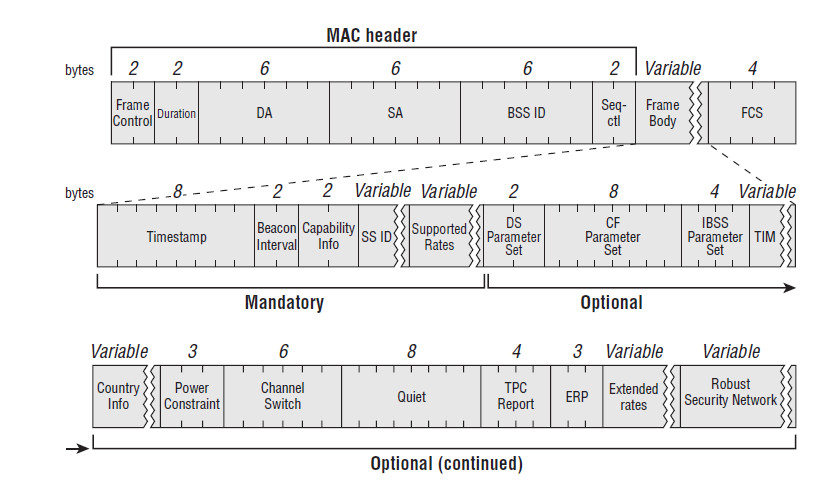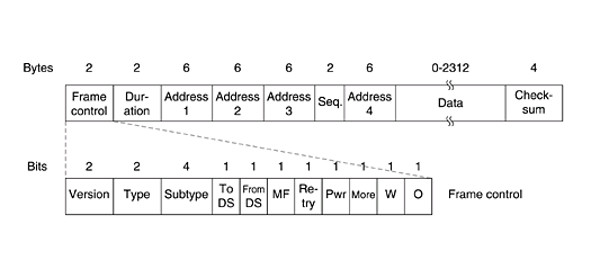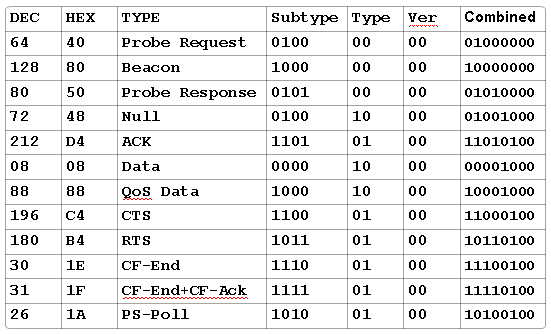In this article I will show you how to make a WiFi beacon spammer on ESP8266. Beacon spamming involves broadcasting a valid IEEE 802.11 beacon frames using fake SSIDs and MAC addresses. This educational project is hackable and easy to get running. The code is on GitHub, here.
What is WiFi Beacon?
WiFI beacon frames are used by the access points to communicate throughout the serviced area the characteristics of the connection offered to the cell members. This information is used by clients trying to connect to the network as well as clients already associated. I found a few similar example projects in the web (see references section). They all are using hardcoded, raw packets. What doesn’t look handy if we want to modify some fields. WiFi beacon packet is not a magical thing. It is kind of WiFi IEEE 802.11 management frame. These frames contain MAC header, frame body and information elements (see figure-1).
MAC Header
Beacon frame starts with a MAC header which consist of several fields.
- frame control – control bits (figure-2 and figure-3),
- DA – destination MAC address; we use ethernet broadcast so the address is FF:FF:FF:FF:FF:FF,
- SA – source MAC address; we should set here some fake MAC address,
- BSS ID – Basic Service Set Identifier; this field usually represents access point MAC address so we can use SA address,
- seq-ctl – sequence control; we can use zero value here.
Frame Body
Nextly, frame body which is one of the management frames. Bellow is really cool struct from Linux sources that describes all management frame types.
typedef struct {
wifi_ieee80211_hdr_t hdr;
union {
struct {
uint16_t reason_code;
} __attribute__ ((packed)) deauth;
struct {
uint16_t capab_info;
uint16_t listen_interval;
/* followed by SSID and Supported rates */
uint8_t variable[0];
} __attribute__ ((packed)) assoc_req;
struct {
uint16_t capab_info;
uint16_t status_code;
uint16_t aid;
/* followed by Supported rates */
uint8_t variable[0];
} __attribute__ ((packed)) assoc_resp, reassoc_resp;
struct {
uint16_t capab_info;
uint16_t listen_interval;
uint8_t current_ap[6];
/* followed by SSID and Supported rates */
uint8_t variable[0];
} __attribute__ ((packed)) reassoc_req;
struct {
uint16_t reason_code;
} __attribute__ ((packed)) disassoc;
struct {
uint8_t timestamp[8];
uint16_t beacon_int;
uint16_t capab_info;
/* followed by some of SSID, Supported rates,
* FH Params, DS Params, CF Params, IBSS Params, TIM */
uint8_t variable[0];
} __attribute__ ((packed)) beacon;
struct {
/* only variable items: SSID, Supported rates */
uint8_t variable[0];
} __attribute__ ((packed)) probe_req;
struct {
uint8_t timestamp[8];
uint16_t beacon_int;
uint16_t capab_info;
/* followed by some of SSID, Supported rates,
* FH Params, DS Params, CF Params, IBSS Params */
uint8_t variable[0];
} __attribute__ ((packed)) probe_resp;
struct {
uint8_t category;
union {
struct {
uint8_t action_code;
uint8_t dialog_token;
uint8_t status_code;
uint8_t variable[0];
} __attribute__ ((packed)) wme_action;
struct {
uint8_t action_code;
uint8_t element_id;
uint8_t length;
uint8_t switch_mode;
uint8_t new_chan;
uint8_t switch_count;
} __attribute__((packed)) chan_switch;
} u;
} __attribute__ ((packed)) action;
} body;
} __attribute__ ((packed)) wifi_ieee80211_mgmt_t;
Information Elements
Information elements consist of three fields and are append to frame body.
- element_id – identifier (1B),
- len – len of payload (1B),
- payload – an infromation, some value.
Parts Required
- ESP8266 Development Module (for example based on ESP-12x)
Software
This code is written in C and can be compiled using xtensa-lx106-elf-gcc. Don’t know how to start? Please read about installing ESP8266 RTOS SDK on Linux.
/**
* Copyright (c) 2019, Łukasz Marcin Podkalicki <lpodkalicki@gmail.com>
* ESP8266/010
* An education project of WiFi Beacon Spammer.
*/
#include <string.h>
#include "freertos/FreeRTOS.h"
#include "freertos/task.h"
#include "esp_wifi.h"
#include "esp_event_loop.h"
#include "esp_log.h"
#include "esp_system.h"
#include "esp_err.h"
typedef struct {
uint16_t version:2;
uint16_t type:2;
uint16_t subtype:4;
uint16_t to_ds:1;
uint16_t from_ds:1;
uint16_t mf:1;
uint16_t retry:1;
uint16_t pwr:1;
uint16_t more:1;
uint16_t w:1;
uint16_t o:1;
} wifi_ieee80211_frame_ctrl_t;
typedef struct {
wifi_ieee80211_frame_ctrl_t frame_ctrl;
uint16_t duration;
uint8_t da[6];
uint8_t sa[6];
uint8_t bssid[6];
uint16_t seq_ctrl;
} wifi_ieee80211_hdr_t;
/* linux sources */
typedef struct {
uint8_t timestamp[8];
uint16_t beacon_int;
uint16_t capab_info;
/* followed by some of SSID, Supported rates,
* FH Params, DS Params, CF Params, IBSS Params, TIM */
uint8_t variable[0];
} wifi_ieee80211_mgmt_beacon_t;
typedef struct {
uint8_t element_id;
uint8_t len;
uint8_t variable[0];
} wifi_ieee80211_element_t;
static const char *TAG = "spammer";
static const char *names[] = {
"1 - hello",
"2 - it's me",
"3 - your wifi",
"4 - I'm talking to you",
};
static esp_err_t event_handler(void *ctx, system_event_t *event);
static void spammer_task(void *prv);
void
app_main(void) {
tcpip_adapter_init();
ESP_ERROR_CHECK(esp_event_loop_init(event_handler, NULL));
wifi_init_config_t cfg = WIFI_INIT_CONFIG_DEFAULT();
ESP_ERROR_CHECK(esp_wifi_init(&cfg));
ESP_ERROR_CHECK(esp_wifi_start());
ESP_LOGI(TAG, "ESP-IDF version:%s\n", esp_get_idf_version());
for (uint8_t i = 0; i < sizeof(names) / sizeof(names[0]); ++i) {
ESP_LOGI(TAG, "SSID[%d]=%s", i, names[i]);
}
xTaskCreate(spammer_task, "spammer_task", 4096, NULL, 5, NULL);
}
esp_err_t
event_handler(void *ctx, system_event_t *event) {
return ESP_OK;
}
static size_t
create_beacon_packet(const char *ssid, uint8_t id, uint8_t *buff, size_t buffsize) {
if (buff == NULL || buffsize < (60 + strlen(ssid))) {
return (-1);
}
size_t len = 0;
/* header */
wifi_ieee80211_hdr_t *hdr = (wifi_ieee80211_hdr_t *) buff;
memset(hdr, 0, sizeof(wifi_ieee80211_hdr_t));
*hdr = (wifi_ieee80211_hdr_t) {
.frame_ctrl = (wifi_ieee80211_frame_ctrl_t) {
.subtype = 0x8 // beacon
},
.duration = 0,
.da = {0xff, 0xff, 0xff, 0xff, 0xff, 0xff}, // destination address (broadcast)
.sa = {0xba, 0xde, 0xaf, 0xfe, 0x00, id}, // source address (fake)
.bssid = {0xba, 0xde, 0xaf, 0xfe, 0x00, id}, // BSSID (fake)
};
len += sizeof(wifi_ieee80211_hdr_t);
/* beacon */
wifi_ieee80211_mgmt_beacon_t *beacon = (wifi_ieee80211_mgmt_beacon_t *) (buff + len);
memset(beacon, 0, sizeof(wifi_ieee80211_mgmt_beacon_t));
beacon->beacon_int = 100; // 100TU = 102.4 milliseconds
beacon->capab_info = 0b00110001 << 8 | 0b00000100; // capabilities subfields
len += sizeof(wifi_ieee80211_mgmt_beacon_t);
/* SSID */
wifi_ieee80211_element_t *element = (wifi_ieee80211_element_t *) (buff + len);
element->element_id = 0x00; // id of SSID element
element->len = strlen(ssid);
memcpy(element->variable, ssid, element->len);
len += sizeof(wifi_ieee80211_element_t) + element->len;
/* supported rates */
element = (wifi_ieee80211_element_t *) (buff + len);
element->element_id = 0x01; // id of Supported Rates
element->len = 8;
memcpy(element->variable, (const uint8_t[]) {0x82, 0x84, 0x8b, 0x96, 0x0c, 0x12, 0x18, 0x24}, element->len);
len += sizeof(wifi_ieee80211_element_t) + element->len;
/* DS parameters */
uint8_t channel;
esp_wifi_get_channel(&channel, NULL);
element = (wifi_ieee80211_element_t *) (buff + len);
element->element_id = 0x03; // id of DS params
element->len = 1;
memcpy(element->variable, (const uint8_t[]) {channel}, element->len);
len += sizeof(wifi_ieee80211_element_t) + element->len;
/* traffic indication map */
element = (wifi_ieee80211_element_t *) (buff + len);
element->element_id = 0x05; // id of Traffic Indication Map
element->len = 4;
memcpy(element->variable, (const uint8_t[]) {0x01, 0x02, 0x00, 0x00}, element->len);
len += sizeof(wifi_ieee80211_element_t) + element->len;
return len;
}
static void
xmit_beacon(const char *ssid, uint8_t id) {
size_t len;
uint8_t buff[128];
len = create_beacon_packet(ssid, id, buff, sizeof(buff));
for (uint8_t i = 0; i < 5; ++i) { // sending the same packet 5 times
esp_wifi_send_pkt_freedom(buff, len, 1);
vTaskDelay(1 / portTICK_PERIOD_MS);
}
}
void
spammer_task(void *prv) {
while (1) {
/* repeating the process 10 times gives better result! ;) */
for (uint8_t i = 0; i < 10; ++i) {
for (uint8_t j = 0; j < sizeof(names) / sizeof(names[0]); ++j) {
xmit_beacon(names[j], j);
}
}
vTaskDelay(10 / portTICK_PERIOD_MS);
}
}


